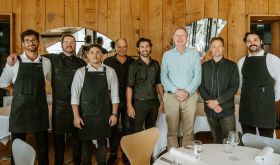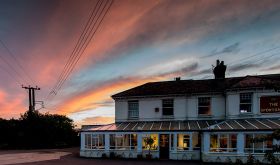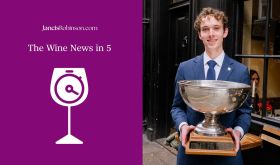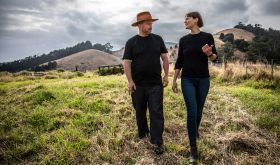Monica Brown will leave London later this month en route for her new home in Melbourne, Australia, at the end of a decade during which she has represented some of the world’s most respected chefs.
In the UK her company, Lotus PR, represents Heston Blumenthal, Sat Bains in Nottingham and Clare Smyth within the Gordon Ramsay Group. She looks after Rainer Becker and the Zuma restaurants worldwide and will handle their next opening in New York in late November.
Other chefs who heed her professional advice include Alex Atala in Brazil, Tetsuya Wakuda in Australia, Spanish chef David Munoz, who will open a London restaurant at the end of this year, and Jock Zonfrillo, a chef of Scottish/Italian descent, now cooking in Adelaide, who expounds the healing virtues of Aboriginal cooking and for whose new TV series, Nomad Chef, Brown has just handled numerous press interviews.
This Scottish/Italian theme was to recur throughout what I was to discover was the first interview Brown has ever given, despite nursing so many chefs through so many. She had asked that we meet at The River Café in west London because the restaurant highlight of her childhood in Blantyre, a small mining town in Scotland, had been the occasional family outing to Da Luciano’s, an Italian restaurant that flourished in nearby Bothwell.
A colourful plate of buffalo mozzarella, Sorrento tomatoes and yellow peppers followed by tagliatelle with Scottish girolles and a glass of Pieropan Soave Classico 2013 dissolved Brown’s nerves, allowing her natural ebullience and enthusiasm for chefs to describe what she calls ‘her amazing professional journey'.
It all began with the good, seasonal Scottish diet Brown grew up with incorporating fish from Loch Fyne, soft fruit from the Clyde Valley and the thick soups her father, the family cook, made. But Brown’s path into restaurants, once she had moved to London aged 20, was by no means straight.
She worked in telephone sales, as a tour rep in Italy, where she discovered that meat does not have to be overcooked, and in recruitment, before a stint with a catering recruitment agency took her into what she described as her ‘spiritual zone’.
'I found I just loved talking and listening to chefs', she explained. 'They’re direct, occasionally abrupt but they always express just how they feel and I am very happy with that. Kitchen humour just seems to be my kind of humour. There isn’t a day that goes by without Sat Bains making everyone in our office laugh. The whole business became a wonderland to me although I know I never want to be a chef, a waiter or to own my own restaurant.'
But this closer working relationship with restaurants revealed that Brown possesses another essential attribute for the business, the ability she refers to as ‘putting bums on seats’. Initial success with a Soho restaurant led to a PR role for Claudio Pulze’s five restaurants in central London. When the positive impact Brown was having led to a marked increase in the quantity of fish the restaurants were ordering, the fish supplier suggested that Brown go out to Bray, Berkshire, to meet Blumenthal. This meeting in 2003 was to change both their professional lives and the image of British cooking, because in Blumenthal’s opinion, 'Brown broke the mould of restaurant PR.'
Blumenthal then had two Michelin stars but the restaurant was struggling financially and was busy only at the weekend. After interviewing her, he personally served her his tasting menu that had the same emotional effect on her as listening to a Puccini opera. The bond between them (pictured above courtesy of Charlie Bibby/FT) is very close – Brown describes Blumenthal as ‘the brother I never had’ – and has led to numerous professional highs for Blumenthal. For her it also led to her most challenging professional episode when an outbreak of norovirus, the vomiting bug, forced the temporary closure of The Fat Duck in 2009.
Two years later she was handling the opening of Dinner, Blumenthal’s restaurant in the Mandarin Oriental, Knightsbridge. She says she was genuinely surprised that this was treated not as just another restaurant opening but as a major international news item, Brown believes that securing the right coverage for her clients consumes only 20% of the time she spends looking after them. 'My other roles range from life coach to counsellor, HR outlet, brand manager and agent for the many commercial proposals that now come their way. And whipping girl, of course, when things don't go quite as planned.'
For all this, and the privilege to stay up with chefs into the ‘wee hours’ as Brown put it – after all, chefs only start to wind down after midnight – Brown charges £2-3,000 per month per restaurant. 'I can’t charge more than that. I know how many customers they have to serve to generate this amount of money. For us both to be successful I have to become a part of them', she added,
Brown planned her move to Australia for lifestyle reasons. 'It’s London not England that has made me and now that I’m 48 I want a different pace of life', she explained. Whether she will get it remains to be seen. No sooner had she decided to move, than Blumenthal succumbed to an offer from Crown Resorts, Melbourne, to transfer The Fat Duck there for six months while Bray is closed for refurbishments and then to open a second Dinner in its place.
Brown will handle both these openings. It may be some time before she gets to the beach.













